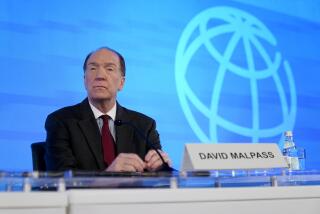Cutting off corruption
- Share via
WHEN PRESIDENT BUSH appointed former Deputy Defense Secretary Paul D. Wolfowitz as head of the World Bank 18 months ago, it was as if John Ashcroft had been tapped to run the American Civil Liberties Union. Not since an architect of another war, Robert McNamara, led the bank has there been such mistrust within the development community, which typically ranges from left-leaning to socialist on the political scale.
The clash of perspectives is part of the reason for the recent tiff over Wolfowitz’s drive to root out corruption in poor countries. In advance of this week’s meeting of finance ministers in Singapore, Britain threatened to withhold a $94-million contribution to the bank, while debate over Wolfowitz’s policies has been roiling the bank’s executive board for months.
Critics are irked by Wolfowitz’s tendency to cut off money to governments accused of corruption. Last year, he suspended $800 million in loans to a suspect program for maternal and children’s health in India, and he suspended debt relief to the Republic of Congo after its president ran up an $80,000 hotel bill in New York. Under his leadership, the bank has blocked more than $1 billion in loans because of illegal practices by recipients.
Other World Bank chiefs have paid lip service to fighting corruption, but none has been so ready to do something about it. Opponents contend that his approach punishes the poor and innocent more than the guilty; even though some of the money in India may have been embezzled, for example, most of it was aiding needy children. Yet this ignores the fact that there is need everywhere, while aid is limited and should go to places it would be best spent. Corruption contributes to political instability, discourages private investment and justifies the views of foreign-aid opponents who argue that it’s pointless to give money to poor countries that would only squander it.
This isn’t to say that all World Bank policies are beyond reproach. Demands that loan recipients privatize such industries as water delivery have often done more harm than good. Yet the notion of withholding aid from countries that would waste it is sound. Unfortunately, it is also likely to be lost. The bank’s policy board demanded on Monday that members have more input on decisions to suspend funding.
Wolfowitz has thwarted most of his critics by consistently doing the right thing. He has increased bank lending, helped lead a drive to forgive the debts of some of the world’s poorest nations, spoken out against the developed world’s agricultural protectionism and is a tireless advocate for the principle that rich countries are obliged to live up to their past promises to increase foreign aid. He has earned more leeway from his overseers, even if they don’t approve of his friends in the White House.
More to Read
Sign up for Essential California
The most important California stories and recommendations in your inbox every morning.
You may occasionally receive promotional content from the Los Angeles Times.












